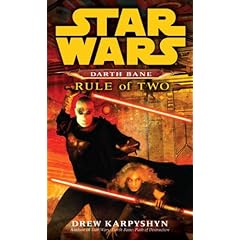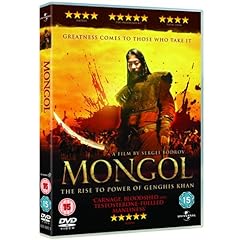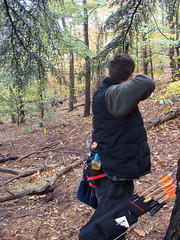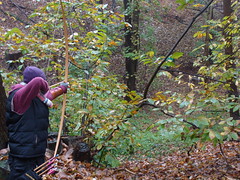Last weekend Richard and myself and other members of Kings Norton Traditional Archers took part in the Avalon shoot. It was a 40 target shoot, all 3D’s!! We all had a really good time. Phil, the youngest member of our club, did exceptionally well shooting from Adult pegs, and won a medal at the end of the day. I had a pretty mediocre first half scoring 200 but in the second half I scored well over 300 which only served to irritate me when I realised that if I had shot as well in the first half I’d have probably won something too! Regardless of that though it was a really well laid out course and great fun to shoot. As always I have uploaded photo’s from the day to flickr, below are a couple of snaps.
Tag Archives: Personal
Darth Bane: The Rule of Two
 Just under two years ago I read and reviewed Darth Bane: Path of Destruction, which I thoroughly enjoyed. I remember at the time hoping that Drew Karpyshyn would write a sequel. I felt that Bane was an incredibly well realised character and one that the reader is drawn to and serves to illustrate that good and evil aren’t necessarily absolutes. A couple of weeks ago I was pleased to learn that a sequel had been released so I bought a copy and read it in the space of two evenings.
Just under two years ago I read and reviewed Darth Bane: Path of Destruction, which I thoroughly enjoyed. I remember at the time hoping that Drew Karpyshyn would write a sequel. I felt that Bane was an incredibly well realised character and one that the reader is drawn to and serves to illustrate that good and evil aren’t necessarily absolutes. A couple of weeks ago I was pleased to learn that a sequel had been released so I bought a copy and read it in the space of two evenings.
Darth Bane: The Rule of Two continues where the previous book ended. Darth Bane is now the Dark Lord of the Sith after destroying the entire Sith order who had united under the banner of The Brotherhood of Darkness. In Bane’s eyes The Brotherhood of Darkness with it’s emphasis on equality was a perversion of the true ideals of the Sith and had to be destroyed so the Sith order could be rebuilt based on it’s oldest law. As the last surviving Sith Darth Bane promulgated a harsh new directive: The Rule of Two:
Only two there should be; no more, no less.
One to embody the power, the other to crave it.
At the beginning of the book, after Brotherhood have all been destroyed by a thought bomb, Bane comes across a young ten year old girl who is sensitive to the Force, and who in a fit of rage kills two Jedi. Though she is young Rain possesses an instinctive link to the dark side that rivals his own. Bane is impressed by her power and takes her as his apprentice: Darth Zannah. With his guidance she will become essential in his quest to destroy the Jedi and dominate the galaxy.
It’s a wonderfully entertaining book, that captivates from beginning to end. We learn more about Bane and his ambitions and his quest for greater knowledge and power. We watch as he continuously tests his young apprentice and we are not only drawn into his scheming but also into hers. This serves to constantly remind the reader that the essence of the Rule of Two is that the Apprentice will one day grow stronger or more cunning than his/her own master and on that day must kill the Master, assume the mantle of Dark Lord of the Sith, and find an apprentice to train in the ways of the Dark Side.
I wont reveal much more of the plot but I will recommend this book, as a great bit of fun reading … also I really hope there is a follow up since Bane’s story definitely does not end with this book.
Marcus Aurelius
Been reading a lot this weekend, it’s the only form of escape I can turn to without relying on any form of planning. I’ve got a couple of book reviews to write but I thought I’d post up some passages I just read by Marcus Aurelius which seem relevant right now for a number of reasons that I don’t intend to elaborate on …
All things are linked with one another, and this oneness is sacred; there is nothing that is not interconnected with everything else. For things are interdependent, and they combine to form this universal order. There is only one universe made up of all things, and one creator who pervades them; there is one substance and one law, namely, common reason in all thinking creatures, and all truth is one--if, as we believe, there is only one path of perfection for all beings who share the same mind.
… and …
Why should anyone be afraid of change? What can take place without it? What can be more pleasing or more suitable to universal Nature? Can you take your bath without the firewood undergoing a change? Can you eat, without the food undergoing a change? And can anything useful be done without change? Don't you see that for you to change is just the same, and is equally necessary for universal Nature?
… and also …
Discard everything except these few truths: we can live only in the present moment, in this brief now; all the rest of our life is dead and buried or shrouded in uncertainty. Short is the life we lead, and small our patch of earth.
… and finally …
nowhere can a man find a quieter or more untroubled retreat than in his own soul
our circle of compassion
A human being is a part of the whole called by us universe, a part limited
in time and space. He experiences himself, his thoughts and feeling as
something separated from the rest, a kind of optical delusion of his
consciousness. This delusion is a kind of prison for us, restricting us to
our personal desires and to affection for a few persons nearest to us.
Our task must be to free ourselves from this prison by widening our
circle of compassion to embrace all living creatures and the whole of
nature in its beauty.
-- Albert Einstein
Nature brings Solace …
I’ve been having a wonderful weekend. It’s always nice to get away, although in fairness the Warwickshire countryside isn’t necessarily that far away, still not every journey should be measured in terms of physical distance. I woke up pretty early this morning, like many people I totally forgot the clocks went back an hour last night. I tend to be restless when I wake so I got up and decided to take in the view. It’s stunning here. I don’t know what it is about the countryside, about being away from the city that I find so calming. I experienced something similar a couple of months ago when Richard and I went to Devon for an eight day Archery shoot, a trip that helped me to confront certain things I guess I’ve been hiding from.
Sitting on this balcony this morning gazing across the country side, as is often the case, I was absorbed by my own thoughts. Isn’t it strange and yet wonderful how the mind can meander from one thought to another and then suddenly present you with an answer or an insight from the deepest recesses of your memory. That’s how I was reminded of something that Anne Frank wrote, and I think it echoes my own feelings right now:
The best remedy for those who are afraid, lonely or unhappy is to go outside, somewhere where they can be quiet, alone with the heavens, nature and God. Because only then does one feel that all is as it should be and that God wishes to see people happy, amidst the simple beauty of nature. As long as this exists, and it certainly always will, I know that then there will always be comfort for every sorrow, whatever the circumstances may be. And I firmly believe that nature brings solace to all troubles.
Proverbs 11:29
I’m thinking that we should all remember the wisdom of Solomon in the Book of Proverbs:
He that troubles his own house shall inherit the wind:
and the fool shall be servant to the wise of heart.
The phrase “own house” could easily be substituted with any (social?) group an individual belongs to: your friends, your family, a sports team, your colleagues at work, your country and so on. The tragedy is that it’s difficult to see when we are falling foul of this, because it really doesn’t take much. It seems to me that when one believes one is right it’s easy to become rigidly inflexible, it’s easy to lack consideration for the feelings of others, or indeed to dismiss them out of hand out of sheer frustration with the other rather than taking a step back and questioning one’s own standpoint. Worse is that it’s easy to overlook the immediate damage this can cause to relationships, to how people perceive you, and of-course their willingness to want to engage with you. It seems to me this should be interpreted as a serious lapse in judgment in any of us, and near fatal lapse in judgment for anyone in a position of authority/leadership; it tends to undermine trust by creating distance; it’s becomes a barrier to any constructive dialogue; and those around you can lose their voice. When that happens you have, quite literally, inherited the wind.
Part of the problem is that we are deeply emotional creatures, and we wear those emotions like a cloak around us. Something I’ve observed often is that even when an individual is putting forth an argument in a manner that he/she might feel is objective, concise, erudite and wholly reasonable, their body language, or language, or tone, or even a slight unconscious inflection when uttering a single word, can send out a completely different message. It’s this dichotomy that we create that puts us at odds with those observing us, those that we are trying to communicate with.
It’s actually quite amusing to observe when this happens during the current political debates taking place between the candidates in the American Presedential election. That’s not really not what I want to talk about though.
So I guess the question becomes, how do we guard against this? How do I know when I’m doing this? It shouldn’t be a paradox because in as much as we are emotional creatures we are also hugely perceptive creatures. Yet it becomes a paradox when you ask what is it about our emotions that seemingly overrides our ability to perceive the effect our words and actions have on others? or worse, what is it that overrides the need to perceive the effect we have on others – until the damage is already done?
Is it something that we can guard against by simply thinking or taking a moment to pause before speaking/reacting? Is this a quality that can be taught? or is this simply something we have to learn in the crucible of our own minds as we reflect on each time we make this mistake? or should we simply temper what we do with the knowledge that we are part of a (social) group and that our behaviour will reflect how much we are accepted and valued, or indeed, rejected by that group?
As an observation this is something I’ve learned the hard way, for me it was brought into sharp relief when my father died. Fortunately, as social groups go, families are rather more forgiving than others 🙂
"The universe speaks in many languages, but only one voice ...
It speaks in the language of hope."
"It speaks in the language of trust. It speaks in the language of
strength and the language of compassion. It is the language of the
heart and the language of the soul. But always it is the same voice.
It is the voice of our ancestors speaking through us and the voice
of our inheritors waiting to be born. The small, still voice that says:
'We are one. No matter the blood, no matter the skin, no matter the
world, no matter the star. .. We are one. No matter the pain, no
matter the darkness, no matter the loss, no matter the fear. .. We
are one.' Here, gathered together in common cause, we begin to
realize this singular truth and this singular rule that we must be
kind to one another. Because each voice enriches us and ennobles
us and each voice lost diminishes us. We are the voice of the
universe, the soul of creation, the fire that will light our way to
a better future. We are one."
G'Kar in "The Paragon of Animals"
Mongol: The Rise To Power Of Genghis Khan
 Finally got round to watching Sergei Bodrov’s visually stunning Mongol – The Rise To Power Of Genghis Khan. The movie is a sweeping epic that is rumored to be the first part of a trilogy that Bodrov is making about the Mongol ruler. In this film though Bodrov focuses on the life of the young Temudgin and his ascent to power.
Finally got round to watching Sergei Bodrov’s visually stunning Mongol – The Rise To Power Of Genghis Khan. The movie is a sweeping epic that is rumored to be the first part of a trilogy that Bodrov is making about the Mongol ruler. In this film though Bodrov focuses on the life of the young Temudgin and his ascent to power.
When his father is poisoned and his lands and posessions taken, Temudgin flees from his father’s rivals. He is saved by a young prince, Jamukha, and the two become blood brothers. Later that bond of friendship is tested, though, when the grown Temudgin wages a war, in violation of the Mongol code, to win back the captive wife Borte. As Temudgin asserts his own power, he must also face Jamukha in all-out battle if he is to secure the safety of his family. The movie offers a unique look at the influence of love and loyalty to the life and times of one of history’s most renowned rulers.
This film isn’t historically accurate and is very much a revisionist account of the early life of the enigmatic Genghis Khan. This fact didn’t make the movie any less captivating, or enjoyable. It is a gorgeously shot epic, with beautifully composed landscape shots punctuated by thundering hooves and bloody, slow-motion battle sequences.
Definitly worth watching!
Not so random thoughts …
G'Quan wrote: 'There is a greater darkness than the one we fight. It is the darkness of the soul that has lost its way. The war we fight is not against powers and principalities, it is against chaos and despair. Greater than the death of flesh is the death of hope, the death of dreams. Against this peril we can never surrender. The future is all around us, waiting in moments of transition, to be born in moments of revelation. No one knows the shape of that future, or where it will take us. We know only that it is always born in pain.' -- G'Kar in Babylon 5:"Z'ha'dum"
"Then I will tell you a great secret, Captain. Perhaps the greatest of all time. The molecules of your body are the same molecules that make up this station and the nebula outside, that burn inside the stars themselves. We are starstuff, we are the universe made manifest, trying to figure itself out. As we have both learned, sometimes the universe requires a change of perspective." -- Delenn to Sheridan in Babylon 5:"A Distant Star"
"We create the meaning in our lives. It does not exist independently. Being Anla-shok does not mean worrying about what others will think about us. It does not mean deciding what to do based upon whether or not it serves our sense of ego or destiny. It means living each moment as if it were your last one. It means doing each right thing because it is the right thing. The scale doesn't matter. The where, the when, the how, or in what cause .. none of those things matter. In my life, I've discovered very few truths. Here is the greatest truth I know: Your death, Rastenn, will have a meaning if it comes while you're in fullest pursuit of your heart." -- Sech Turval to Rastenn in Babylon 5:"Learning Curve"
… and finally for now …
"What does the candle represent?"
"Life."
"Whose life?"
"All life, every life. We're all born as molecules in the hearts of a
billion stars, molecules that do not understand politics, policies and
differences. In a billion years we, foolish molecules forget who we
are and where we came from. Desperate acts of ego. We give
ourselves names, fight over lines on maps. And pretend our light is
better than everyone else's. The flame reminds us of the piece of
those stars that live inside us. A spark that tells us: you should know
better. The flame also reminds us that life is precious, as each flame
is unique. When it goes out, it's gone forever. And there will never be
another quite like it. So many candles will go out tonight. I wonder
some days if we can see anything at all."
-- Sheridan and Delenn in Babylon 5:"And All My Dreams, Torn Asunder"
Zen Master Raven
Having spent the previous evening working till way past midnight, I decided to keep my laptop switched off yesterday – It was Saturday after all! Besides I’d come to a realisation earlier in the week. That although I really love what I do at Talis, I’ve been using my work, rightly or wrongly, as a way to hide from other things that I haven’t figured out how to deal with.
Death
Mole came to Raven privately and said, "We haven't talked
about death very much. I'm not concerned about where I will
go, but watching so many family members die, I'm wondering
what happens at the point of death?".
Raven sat silently for a while, then said, "I give away my
belongings".
After visiting dad’s grave yesterday morning, I decided to take a trip into the city center and do a little shopping – wasn’t really sure what I was shopping for. I’ve been having strange moments like that a lot recently – strange in the sense that I’m doing things that feel random, they don’t necessarily have any purpose at the outset. Anyway after buying a couple of DVD’s and some clothes, I ended up at Borders Book Shop in the Bull Ring.
I wasn’t looking for anything in particular, I simply walked from one aisle of books to another glancing at the shelves to see if anything caught my eye. I love Science Fiction and Fantasy novels so I did consciously walk over to that area and spent a while there but didn’t find anything that really stood out. I also spent a fair bit of time rifling through a bunch of Manga novels but I aready own all the good stuff and some of the newer series have proven to be disappointing. Eventually I ended up in the section entitled Philosophy / Spirituality – that’s when I found “Zen Master Raven: Sayings and Doings of a Wise Bird“. When I got back home I proceeded to spend the rest of the afternoon and much of the evening reading it from cover to cover, twice! Here’s why …
I had this terrible feeling that whilst I understood much of it … there’s a huge amount of meaning within it’s covers that I simply can’t figure out … yet … It feels like a thorn in my mind … and I love it …
The Spirit of the Practice
Relaxing with the others after zazen one evening, Owl
asked "What is the Spirit of the practice?"
Raven said, "Inquiry."
Owl cocked his head and asked, "What do I inquire
about?"
Raven said, "Good start."
I think it’s a wonderfully delightful book. The author Robert Aitken, is a well known American Zen Master, whilst he has written a number of other books and essays this piece is very different. His literary device of using animals, unconventional in Zen, is remarkably successful in presenting the promises and risks, hopes and fears of the Tallspruce community that Raven Roshi shares with his students, neighbours and friends. I think this book captures the spirit of Zen as much as any book can, and it demonstrates how Zen can become the practice of a lifetime.
Character
One evening, in a discussion of his personal problems,
Raven asked Brown Bear, "What is the role of character in
the practise?"
Brown Bear said, "I try to keep my promises."
Raven said, "I try to keep my promises, too, but I'm easily
distracted."
Brown Bear said, "The cold wind reminds me."
Aitken’s book is the distillation of a collection of stories, some only a few sentences in length, that, as he sees it, illuminate the Way. These stories are succinct, charming and contain a huge depth of insight. The stories might feel weird, but are hugely compelling.
Very Special
In a group munching grubs one afternoon, Mole
remarked, "The Buddha Shakyamuni was very special
wasn't he! I'm sure there has never been anyone like
him".
Raven said, "Like the madrone."
Mole asked, "How is the madrone unique?"
Raven said, "Every madrone leaf."
Mole fell silent.
Procupine asked, "How does the uniqueness of every
Madrone leaf relate to the practice?"
Raven said, "Your practice."
The Web as a city
Outside.in’s Steven Johnson says the Web is like a city: built by many people, completely controlled by no one, intricately interconnected and yet functioning as many independent parts. While disaster strikes in one place, elsewhere, life goes on. This is a pretty old ted talk from back in 2003, it’s only been released this month. Much of what Steven talks about would feel far more important and powerful if you were listening to this talk five years ago Web culture in particular has advanced far beyond this already. So although dated its still a wonderfully inspiring talk.



